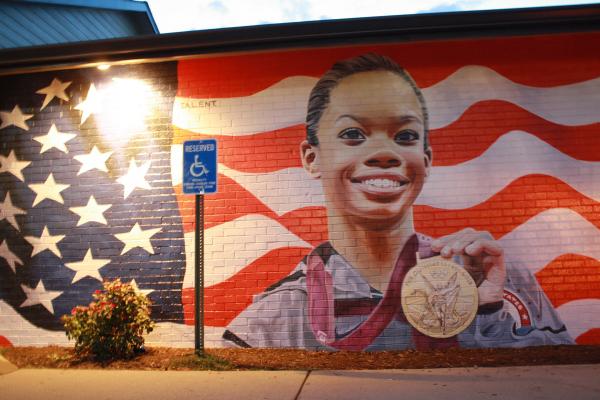I love watching the Olympics. The world comes together for competition at its best.
My country, the United States, has done pretty well this year. Simone Biles has amazed us with her gymnastic skills and four gold medals. Simone Manuel won gold and silver, and inspired us by becoming “the first African American woman to win an individual swimming medal in the Olympics.” As Jerry Brewer of the Washington Post stated, she broke a color barrier that goes back to racist laws of Jim Crow that “kept blacks out of white pools.” And at a spry 31 years, veteran Michael Phelps has given all of us old people a reason to hope.
Ahh, America, the land of the free and the home of the badass Olympians.
But the Olympics has also given Americans an opportunity to rear our ugly heads. The Olympics have shown that in America, we aren’t really free. No, in America you have to play by the rules, and if you don’t live up to national expectations, even an Olympian can become America’s next scapegoat.
Gabby Douglas found that out the hard way. Despite the fact that she was “ nearly flawless on the uneven bars,” social media was scandalized when she failed to honor American protocol. She committed a grave sin against her nation and her fellow citizens united against her. What did she do to earn such scorn? She failed to put her hand on her heart during the national anthem.
But it gets worse. People have taken to Twitter to criticize her hair, accuse her of bleaching her skin, getting breast enhancements, not supporting her teammates, and not smiling enough.
She was an American hero during the 2012 Olympics. Now she’s America’s goat.
“Crabby Gabby,” she’s called on Twitter.
After competing on Sunday evening, Gabby was asked in an interview about the criticism. She apologized for not putting her hand over her heart, “I never meant any disrespect and apologize if I offended anyone.” She continued, “I’ve always said it was an honor to represent the U.S. You always do this for your country, and then, like people say, for yourself and for other people.” Gabby thanked the press, then went to the corner of the room and “had a good, long cry.”
But it’s not just the Twitterverse that’s blaming Gabby. Dr. Mark Dyreson, Olympic scholar and Penn State professor, also piled on the heat. “When it comes to Olympic athlete celebrities, a word to the wise – be careful what you do on the medal stand, you can alienate a lot of your customer base.”
We need to stop blaming Gabby for our bad behavior. This isn’t about her. It’s about us. It’s about American culture. We love to see our heroes fall. But let me be clear: Gabby did nothing wrong. She hasn’t fallen. Americans have pushed her off her pedestal.
Why do we love to see our heroes fall? Because it makes us feel better about ourselves. Anthropologist René Girard claims that we are relational creatures. That is, we form a sense of personal identity not as individuals, but in relationship with others. Girard also claims that we all suffer from “lack of being.”* In other words, we lack a sense of self, a sense of identity. Because we are relational creatures who lack a sense of being, we constantly compare ourselves with others. Gabby is the latest victim of America’s collective “lack of being.” In order to fill ourselves with a sense of worthiness, of being patriotic Americans (with nice hair!), we have to unite against someone whom we can blame for being unpatriotic.
Girard claims that this dynamic is mimetic, or imitative. The more people who unite against Gabby, the more acceptable it is for others to join in oppositional unity against her.
And so it might become obvious that “Crabby Gabby” isn’t about Gabby at all. It’s about us. It’s a projection of our own “crabbiness.” The truth is that those who are scandalized by Gabby’s actions see themselves in her. Sadly, their bitterness and hostility reveal their own lack of being, their own emptiness.
I realize that this truth might alienate some readers who enjoyed uniting against Gabby. I don’t mean to blame anyone who has fallen into the mimetic trap. Why not? Because I suffer from a “lack of being.” I like Gabby, so I really don’t care why she didn’t put her hand over her heart.
But I don’t like everyone in sports. I deal with my “lack of being” by hating others athletes. I particularly enjoy hating Alex Rodriguez and Tom Brady. (Excuse me while I shudder.) I compare myself to those jerks them all the time. “What idiots! If I were in their position I would never, ever have used steroids or deflated footballs! CHEATERS!!!”
By criticizing them I gain a quick shot of identity. And it feels good! But it only last for a few minutes, so I need to do it again … and again. I might compare myself to a neighbor this time. “What a jerk! He parked in front of my house again!” There’s another shot of identity. Pretty soon, this way of forming a sense of self in opposition to others becomes an addiction.
What the Gabby Douglas scandal teaches us about the American soul is that we need an alternative way of forming identity. We will always be relational and mimetic, but we don’t have to be so in a negative way that scapegoats. As Martha Reineke writes in her book Intimate Domain, we can exchange negative mimesis or “acquisitive mimesis for positive mimesis, a phrase that suggests relationships grounded in love, genuine intimacy, and compassion.”
How do we make that exchange? On a personal and national level, it starts with awareness of our tendency to participate in the scapegoat mechanism. America is far from the only nation in the world that has created a sense of identity in opposition to others, but it is an unfortunate aspect of our history – from uniting against the British, to Native Americans, to the African slave trade, to continued racism, we Americans have a long history of scapegoating. On a personal level, we all have our scapegoats – whether they are athletes, politicians, people of other religions or races, or neighbors who take your parking spot.
Becoming aware of the fact that we have scapegoats is the first step to ending the practice of scapegoating and creating a better America. Whenever we fill our “lack of being” by putting another person down, it’s likely we are participating in the scapegoat mechanism. The good news is that once we notice it, we can stop ourselves in the act. We can begin to fill our “lack of being" in another way. As Reineke suggests, we can fill it by relating to others with love, intimacy, and compassion.
*See Girard’s first book, “ Deceit, Desire and the Novel.”
Got something to say about what you're reading? We value your feedback!

